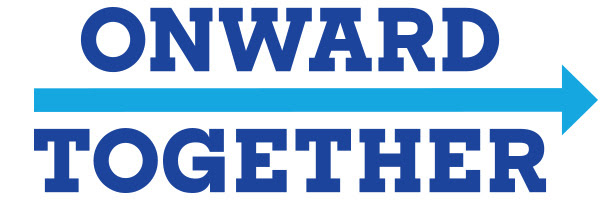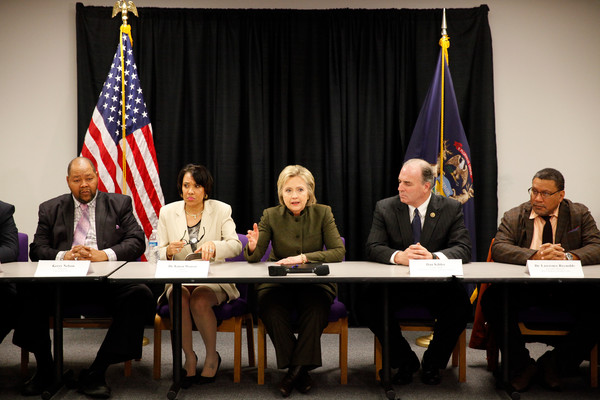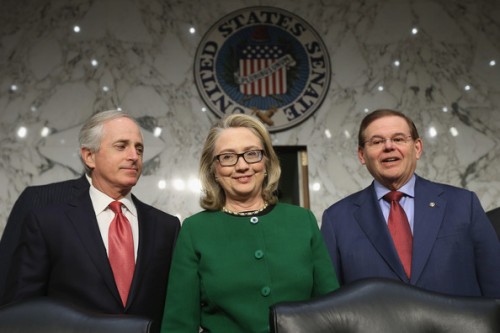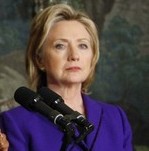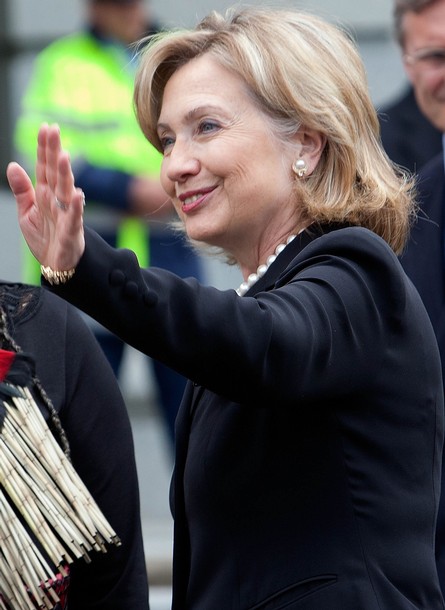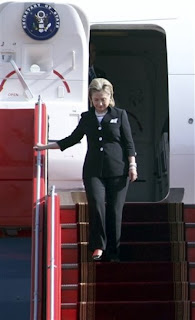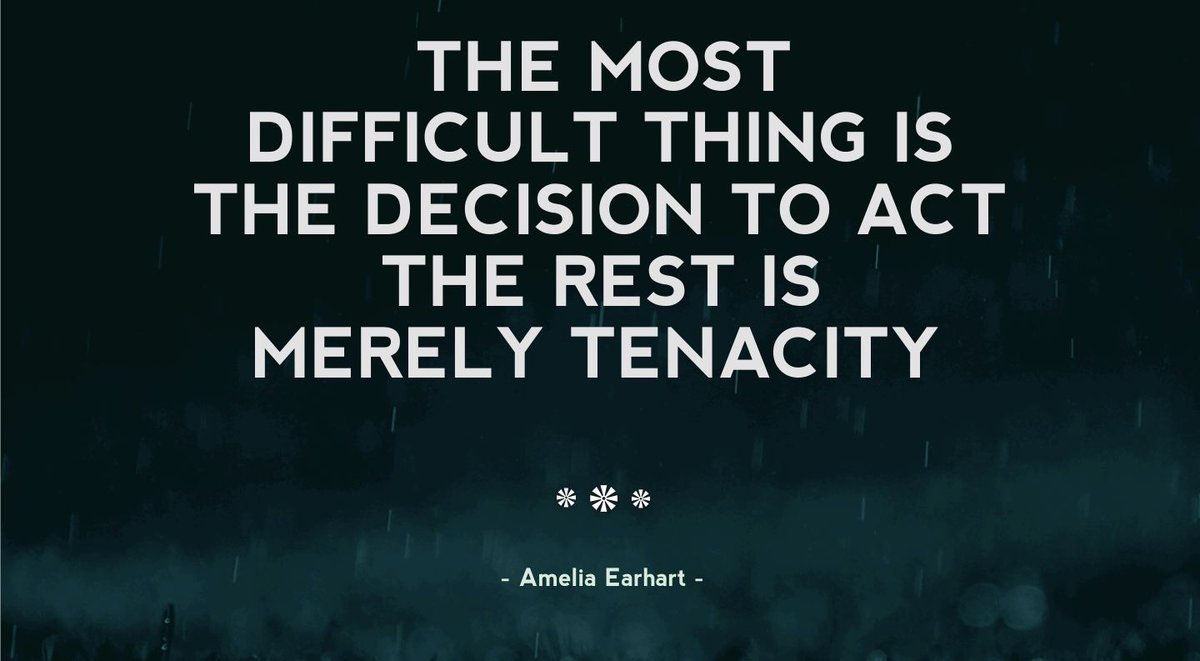QUESTION: But just to ask you two quick things, one on Haiti — the political crisis does not seem yet to be over. Jude (audible) has not actually formally withdrawn his candidacy. Therefore, under the letter of the law, he has to do so. What do you hope to achieve when you see him? Are you going to urge him to withdraw? What’s your — what do you hope to get out of this visit, to try to help resolve the political —
SECRETARY CLINTON: Talking about Haiti, now?
QUESTION: We’re talking about Haiti.
SECRETARY CLINTON: Okay.
QUESTION: Yes.
SECRETARY CLINTON: I am looking forward to talking with the three (inaudible) candidates, as well as President Preval and civil society and the press in Haiti, because we have made it very clear we support the OAS recommendations, and we would like to see those acted on. And I am going to do my own assessment about the way forward. There are many complications that are legitimate concerns raised by various figures in Haiti, not just President Preval, but others, about what is the best compromise.
The international community has been very clear, and I am going to be carrying that message. But I will also be listening. And if there are ideas that we should follow up on, we will take those into account. But we want to see the OAS recommendations followed.
QUESTION: Preval’s mandate expires February 7th.
SECRETARY CLINTON: February 7th, right. Well, we have to talk about — see, that’s one of the problems that we have to talk about.
QUESTION: Sure. Do you think a transitional government should come in? Do you think his mandate should be extended —
SECRETARY CLINTON: I will have more to say at the end of today than I have to say right now, because I don’t want to prejudge what I am going to be discussing with the various people I meet with. But you put your finger on one of the problems is that the president’s existing term expires on February 7th.
QUESTION: What’s your message to Preval?
SECRETARY CLINTON: It’s the same message we have been delivering consistently, and not just the United States. I want to emphasize that this is an international message, that the — we stood behind the OAS when they sent down independent technical experts to evaluate the outcome of the elections. I want to underscore that this was not an American initiative. There were no Americans involved. This was an OAS initiative under the inter-American democratic charter. And it’s not only those of us in the hemisphere that are concerned, but the UN, the European Union, others. And we would like to see those recommendations enacted.
There are timing concerns, there are issues of a continuing government, how that can be structured, and that’s what I am going to be discussing.
QUESTION: And would USAID be (inaudible), or is there any —
SECRETARY CLINTON: No, we are not talking about any of that. We have a deep commitment to the Haitian people. And that goes to humanitarian aid, it goes to governance and democracy programs. We will be going to a cholera treatment center that represents an excellent combination of American and international efforts to try to stem the cholera epidemic, and there has been success in limiting that.
So, we are focused on helping the Haitian people. And one of the ways we want to help them is by making sure that their political choices are respected.
QUESTION: Do you (inaudible) the circumstance (inaudible) suspend or reduce aid —
SECRETARY CLINTON: Not at this time, no.
QUESTION: Thank you.
QUESTION: And what do you think about the pace of reconstruction?
SECRETARY CLINTON: I think it’s been steady, but not adequate to the task that we are confronting, for many reasons that we have analyzed, and have made clear we want to see it expedited, accelerated. And the number of countries and NGOs who are committed to doing that remains very high. But the problems are significant. Some of them are problems of logistics and obstacles, like what do you do with all the rubble? I mean it’s a really big problem.
So, we are sorting all that through. But certainly my team, led by Cheryl Mills, the international team, are really focused on the steady, continuing efforts to bring about positive results from our reconstruction commitment.
QUESTION: Can we return to Egypt, really quick?
SECRETARY CLINTON: Sure.
QUESTION: After the announcement of the vice presidency, what does that mean (inaudible)? Obviously there is not necessarily all the concrete steps you want to see of democratizing, but what’s your message right now to Egypt (inaudible)?
SECRETARY CLINTON: Well, we have made very clear that the concrete steps for democratic and economic reform that President Mubarak mentioned in his speech have to be acted on. The United States has urged that the president appoint a vice president for decades. So, in fact, that has finally come about in the face of this crisis.
But there has to be a commitment by whoever is in the government that they will engage in a national dialogue with the people of Egypt, with the aim at taking actions that will meet the legitimate grievances of the Egyptian people for more participation, for respect for human rights, for the universal human rights that they are entitled to, for economic reforms that will give more opportunity for people. And we want to see all of that happen.
QUESTION: (Inaudible) foreign policy (inaudible) this Administration?
SECRETARY CLINTON: I think that — I don’t label anything like that. I mean this is a very serious time for Egypt, and we are going to do all that we can to support an orderly transition to a situation in which the aspirations of the Egyptians are addressed. And there are many complexities about that, because obviously, Egypt has been our partner, and we have worked closely with Egypt to maintain peace in the region.
The Egyptian-Israeli peace agreement prevented a lot of violence, prevented a lot of loss of life over many years. And we greatly appreciate that. We do not want to see a change toward a regime that would actually continue to foment violence or chaos, either because it didn’t exist or because it had a different view that it wished to impose on the Egyptian people. This is a very complex situation, and we want to be clear about what we expect. And I think that both President Obama and I have done so numerous times.
QUESTION: (Inaudible) two military men (inaudible) director of the intelligence service, is widely regarded as the face of the (inaudible), and then the head of the air force, former head of the air force, is the prime minister. Is this the change you seek?
SECRETARY CLINTON: Arshad, we have said what we expect to see at the end of the process. And we want to encourage steps to be taken that will move us in that direction. And we will keep urging that in public and in private.
QUESTION: Thank you.
SECRETARY CLINTON: Thank you all.












